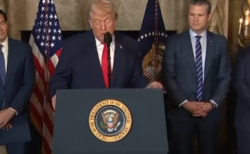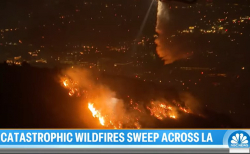
미국의 바락 오바마 대통령은 “기후 변화에 대응하는 것은 우리가 경제냐 아니면 환경이냐를 택일하는 문제가 아니라 우리가 이 땅에서 계속 번성해 가느냐 아니면 사라져 가느냐의 문제다”라고 말한 것처럼, 기후 변화에 대응하는 것은 우리 인류와 다른 생명체가 지구상에서 계속 존속하게 할 것인가 아니면 빈곤에 빠져있는 사람 중 일부를 구하려고 노력하다가 우리 문명을 쇠락하게 만들 것인가를 선택하는 문제인 것이다. 우리는 모든 인류를 구원하기 원한다. 그러기 때문에 ‘유엔이 빈곤 퇴치와 기후 변화에 대처하는 것을 동시에 할 수 없을 경우에는 빈곤 퇴치에 우선을 두어야 하는가’에 대하여 우리는 분명히 반대하는 입장이다.
왜냐하면 첫째, 기후 변화에 제대로 대처하지 못하면 빈곤퇴치를 성공할 수 없다는 것이 우리의 관점이다. BBC뉴스에 따르면, “우리 인류가 새 밀레니엄(Millennium)에 목표로 삼은 세계적인 빈곤층의 수요를 지금의 절반으로 줄이는 것은 올바른 환경 변화에 대처하지 못하면 불가능할 것이라고 보도했다. 그리고 또한, 세계의 빈곤 계층들의 75%정도가 미개발지역에 살고 있다고 한다. 그러기 때문에 그들의 삶 자체가 문명의 혜택을 거의 보지 못하고, 자연 그대로에 의존하여 살고 있다. 지구 온난화 현상으로 인하여 너무나 자주 가뭄과 홍수의 피해를 보고 극심한 온도 변화 때문에 토질 상태가 나빠지고, 결과적으로 아주 빈약한 농업 생산량을 야기한다고 말하고 있다. 그리고 농사에 나쁜 영향을 주는 환경 때문에 결국 사람들이 더욱 더 빈곤해 지는 악순환을 겪고 있다고 한다. The International Food Policy Institute가 2009년 9월30일에 한 발표한 것에 의하면 2050년까지 기후 변화에 적극적으로 대처하지 못할 경우 2500만 명의 어린이들이 새로이 영양실조에 걸릴 것이고, 그들의 주식인 밀의 가격인 90%이상 폭등할 것이고, 선진국에서 쌀의 경작지가 15%이상 감소 될 것이라고 예측했다. 기후 변화로 인하여 경작지가 매우 급속도록 줄어들게 되고, 그래서 이 결과로 농작물의 가격이 급등하게 된다. 그 결과로 더 많은 사람들을 가난으로 몰아버리게 되는 것이다. 추가로 2050년까지 개발도상국에서도 9%-21%까지 농산물의 수확이 감소될 가능성이 있다고 보고되고 있다. 그래서 많은 아프리카 국가들은 이런 이유로 그들의 식량을 수입에 의존하게 될 것이다. 기후 변화가 이렇게 광범위하게 빈곤을 증가시킴에도 불구하고 기후변화를 뒤로하고 빈곤 퇴치를 우선적으로 할 수 있겠는가? 절대 그럴 수 없을 것이다. 만일, 미개발 지역에 살고 있는 75% 가량의 빈곤층 사람들을 도와주고 싶다면 우리는 먼저 이 기후 변화에 올바른 대응을 하기 시작해야 한다.
두 번째로 기후 변화에 대응하는 것은 세계의 모든 사람에게 영향을 주는 아주 심각하고 급박한 현실적인 문제라는 것이다. 물론 기후 변화에 대응하는 금액은 만만한 액수가 아니다. 그러나 기후변화에 적절히 대응하지 못해 들어가는 비용은 이에 비할 바가 못 될 것이다. 2008년 1월에 발행한 New Scientist Magazine에 따르면, 부유한 나라가 겪을 환경적인 손상에 대한 비용은 가난한 나라들의 대외 빚을 모두 합한 것보다 더 극심할 것으로 예상했고, 기후변화에 대한 대응 비용이 현 시세로 47조 달러에 이를 것이라고 예상했다. 이 돈은 이미 우리의 가정과 여러분들의 모든 가정에서 이미 지불하기 시작하고 있는 것이다. 더 중요한 것은 선진국들의 지난 실수로 인하여 가난한 나라의 가정들이 고통 속에서 이 비용을 지불하고 있다는 것을 잊으면 안 된다. 이것은 단지 우리가 규칙을 어겨서 벌금을 내는 상황과는 다르다. 이것은 자그마치 47조 달러인 동시에 수 백 만 명의 목숨을 좌우하는 문제인 것이다. 또한 Natural Resources Defense Council의 조사에 의하면 지구온난화로 인한 4가지 재앙-태풍으로 인한 피해, 부동산의 유실, 에너지 비용, 물 비용만하더라도 2100년 미국 한 나라에서만 연간 1조 9천억 원에 이를 것이라고 예측하였다. 그래서 기후변화로 인하여 생기는 문제는 가난과는 비교할 수 없을 만큼 엄청나게 심각하고 어마어마한 비용이 들어가는 문제다. 2009년 8월에 발행된 USA Today Magazine은 “기후 변화는 자연 재해를 더욱 더 자주 발생시킬 것이며, 그 발생의 횟수와 강도에서 훨씬 더 증가할 것이다. 단지 해수면 상승 문제 하나만 보더라도 이미 지구상의 40여 나라의 존립에 위험을 주는 요소다” 라고 보도했다. 바닷물의 침수와 홍수, 농토의 침식 등은 매콩강, 나일강, 갠지스 강 삼각주의 집중돼 그곳에서 경작되는 농작물을 피폐하게 만들고 있다. 또 다른 기후변화 우리에게 영향을 주는 것은 폭염과 알레르기의 창궐 때문에 많은 사람들이 대량 사망의 원인이기도 하고, 질병을 일으키는 모기들과 같은 해충들을 증가시키고, 홍수를 유발하는 폭우를 증가시키고, 또한 다른 지역에서는 극심한 가뭄을 일으키는 등의 영향을 주고 있다.
기후 변화에 의한 영향은 지금 모두에게 너무나 큰 문제이다. 기후 변화는 단지 빈곤을 일으키는 한 가지 원인정도가 아니라 가장 급박하고 현실적으로 인류를 위협하는 문제이기 때문에, 지금 빈곤 퇴치에 우선권을 두는 것이 무의미하다. 우리는 아픈 부위의 원인 치료를 해야지 증상만을 치료해서는 안 된다. 그러므로 우리는 환경변화에 대응하는 것이 빈곤퇴치를 우선하는 것보다 더 급박하고 중요하다는 것을 주장한다.
조아라(Ahra Cho), 그라나다 힐스 하이스쿨 10학년
Climate Change
President Barack Obama once said, “Climate change is not a choice between our environment and our economy; it's a choice between prosperity and decline.” Do we choose to let the human race and life on earth continue on? Or do we choose to let the world dwindle by trying to save a fraction of the people in poverty? We wish to save all of humanity, therefore stand in opposition to the resolution: when it cannot do both, the United Nations should prioritize poverty reduction over combating climate change.
For our first contention, the reduction of poverty cannot be successful without first combating climate change. According to BBC News, the key Millennium Goal of reducing poverty in half in a decade cannot be met without better environmental protection. They also report that seventy-five percent of the world's poor are from the rural area, and they depend directly on natural systems for their livelihood. With global warming, there would be frequent droughts and floods, severely fluctuating temperatures, bad soil conditions, and overall just bad agricultural productivity. Because of its effect on agriculture, climate change causes poverty. The International Food Policy Institute, on September 30, 2009, projected that “in 2050, there will be 25 million additional malnourished children, a 90% increase in wheat prices, and a 15% decline in irrigated rice yields in developing countries, all compared to a scenario without climate change.” The changing climate patterns lead to dramatic decreases in agricultural yields, thus driving up prices, and thus pressing more and more people into poverty. Additionally, it has been estimated that until 2050 developing countries may experience a decline of between 9 and 21 percent in potential agricultural productivity. For many African countries, this could lead to increased dependency on food imports. How can we prioritize poverty reduction while neglecting climate change when in fact, climate change causes widespread poverty? We can’t. With about 75% of the people in poverty concentrated in rural areas, if we want to help poverty, the first step should be that of combating climate change.
For our second contention, combating climate change is an urgent global issue that affects everyone. The price tag for the fight against climate change may not come cheaply, but the cost of failing to act will be much greater. As the New Scientist Magazine, on January 2008, said, “Ecological damage by rich nations is costing poor nations more than their combined foreign debt, and climate change have cost up to $47 trillion at current values.” This is money that has already cost my family, your family, and most importantly, the already struggling families of poverty who have to pay the price for our mistakes as developed nations. This is not like the fine we pay for breaking the rules; this is $47 trillion dollars and millions of lives. Also, research from the Natural Resources Defense Council states that four global warming impacts alone -- hurricane damage, real estate losses, energy costs, and water costs -- will come with a price of almost $1.9 trillion annually (in today's dollars) for the US by the year 2100. This is serious, and the climate change impacts are far too great when compared to poverty. As the August 2009 issue of USA Today Magazine concludes, “Climate change will increase the frequency and intensity of natural disasters. Sea level rise directly threatens the existence of some 40 countries. Saltwater intrusion, flooding, and erosion could destroy agriculture in the densely populated Mekong, Nile, and Ganges deltas.” Some other effects of climate change that affect us today are more frequent deaths due to heat waves and allergy attacks, changes in the range of animals that carry diseases such as mosquitoes, heavier rainfall causing floods, and extreme droughts in other regions.
The impacts of climate change affect everyone immensely, right now. Not only that, climate change is one of the causes of poverty and therefore prioritizing poverty will be useless. We are trying to attack the source of the disease, not the symptoms. Therefore, we advocate for combating climate change when in conflict with poverty reduction.
Ahra Cho, 10th Grade Granada Hills High School
왜냐하면 첫째, 기후 변화에 제대로 대처하지 못하면 빈곤퇴치를 성공할 수 없다는 것이 우리의 관점이다. BBC뉴스에 따르면, “우리 인류가 새 밀레니엄(Millennium)에 목표로 삼은 세계적인 빈곤층의 수요를 지금의 절반으로 줄이는 것은 올바른 환경 변화에 대처하지 못하면 불가능할 것이라고 보도했다. 그리고 또한, 세계의 빈곤 계층들의 75%정도가 미개발지역에 살고 있다고 한다. 그러기 때문에 그들의 삶 자체가 문명의 혜택을 거의 보지 못하고, 자연 그대로에 의존하여 살고 있다. 지구 온난화 현상으로 인하여 너무나 자주 가뭄과 홍수의 피해를 보고 극심한 온도 변화 때문에 토질 상태가 나빠지고, 결과적으로 아주 빈약한 농업 생산량을 야기한다고 말하고 있다. 그리고 농사에 나쁜 영향을 주는 환경 때문에 결국 사람들이 더욱 더 빈곤해 지는 악순환을 겪고 있다고 한다. The International Food Policy Institute가 2009년 9월30일에 한 발표한 것에 의하면 2050년까지 기후 변화에 적극적으로 대처하지 못할 경우 2500만 명의 어린이들이 새로이 영양실조에 걸릴 것이고, 그들의 주식인 밀의 가격인 90%이상 폭등할 것이고, 선진국에서 쌀의 경작지가 15%이상 감소 될 것이라고 예측했다. 기후 변화로 인하여 경작지가 매우 급속도록 줄어들게 되고, 그래서 이 결과로 농작물의 가격이 급등하게 된다. 그 결과로 더 많은 사람들을 가난으로 몰아버리게 되는 것이다. 추가로 2050년까지 개발도상국에서도 9%-21%까지 농산물의 수확이 감소될 가능성이 있다고 보고되고 있다. 그래서 많은 아프리카 국가들은 이런 이유로 그들의 식량을 수입에 의존하게 될 것이다. 기후 변화가 이렇게 광범위하게 빈곤을 증가시킴에도 불구하고 기후변화를 뒤로하고 빈곤 퇴치를 우선적으로 할 수 있겠는가? 절대 그럴 수 없을 것이다. 만일, 미개발 지역에 살고 있는 75% 가량의 빈곤층 사람들을 도와주고 싶다면 우리는 먼저 이 기후 변화에 올바른 대응을 하기 시작해야 한다.
두 번째로 기후 변화에 대응하는 것은 세계의 모든 사람에게 영향을 주는 아주 심각하고 급박한 현실적인 문제라는 것이다. 물론 기후 변화에 대응하는 금액은 만만한 액수가 아니다. 그러나 기후변화에 적절히 대응하지 못해 들어가는 비용은 이에 비할 바가 못 될 것이다. 2008년 1월에 발행한 New Scientist Magazine에 따르면, 부유한 나라가 겪을 환경적인 손상에 대한 비용은 가난한 나라들의 대외 빚을 모두 합한 것보다 더 극심할 것으로 예상했고, 기후변화에 대한 대응 비용이 현 시세로 47조 달러에 이를 것이라고 예상했다. 이 돈은 이미 우리의 가정과 여러분들의 모든 가정에서 이미 지불하기 시작하고 있는 것이다. 더 중요한 것은 선진국들의 지난 실수로 인하여 가난한 나라의 가정들이 고통 속에서 이 비용을 지불하고 있다는 것을 잊으면 안 된다. 이것은 단지 우리가 규칙을 어겨서 벌금을 내는 상황과는 다르다. 이것은 자그마치 47조 달러인 동시에 수 백 만 명의 목숨을 좌우하는 문제인 것이다. 또한 Natural Resources Defense Council의 조사에 의하면 지구온난화로 인한 4가지 재앙-태풍으로 인한 피해, 부동산의 유실, 에너지 비용, 물 비용만하더라도 2100년 미국 한 나라에서만 연간 1조 9천억 원에 이를 것이라고 예측하였다. 그래서 기후변화로 인하여 생기는 문제는 가난과는 비교할 수 없을 만큼 엄청나게 심각하고 어마어마한 비용이 들어가는 문제다. 2009년 8월에 발행된 USA Today Magazine은 “기후 변화는 자연 재해를 더욱 더 자주 발생시킬 것이며, 그 발생의 횟수와 강도에서 훨씬 더 증가할 것이다. 단지 해수면 상승 문제 하나만 보더라도 이미 지구상의 40여 나라의 존립에 위험을 주는 요소다” 라고 보도했다. 바닷물의 침수와 홍수, 농토의 침식 등은 매콩강, 나일강, 갠지스 강 삼각주의 집중돼 그곳에서 경작되는 농작물을 피폐하게 만들고 있다. 또 다른 기후변화 우리에게 영향을 주는 것은 폭염과 알레르기의 창궐 때문에 많은 사람들이 대량 사망의 원인이기도 하고, 질병을 일으키는 모기들과 같은 해충들을 증가시키고, 홍수를 유발하는 폭우를 증가시키고, 또한 다른 지역에서는 극심한 가뭄을 일으키는 등의 영향을 주고 있다.
기후 변화에 의한 영향은 지금 모두에게 너무나 큰 문제이다. 기후 변화는 단지 빈곤을 일으키는 한 가지 원인정도가 아니라 가장 급박하고 현실적으로 인류를 위협하는 문제이기 때문에, 지금 빈곤 퇴치에 우선권을 두는 것이 무의미하다. 우리는 아픈 부위의 원인 치료를 해야지 증상만을 치료해서는 안 된다. 그러므로 우리는 환경변화에 대응하는 것이 빈곤퇴치를 우선하는 것보다 더 급박하고 중요하다는 것을 주장한다.
조아라(Ahra Cho), 그라나다 힐스 하이스쿨 10학년
Climate Change
President Barack Obama once said, “Climate change is not a choice between our environment and our economy; it's a choice between prosperity and decline.” Do we choose to let the human race and life on earth continue on? Or do we choose to let the world dwindle by trying to save a fraction of the people in poverty? We wish to save all of humanity, therefore stand in opposition to the resolution: when it cannot do both, the United Nations should prioritize poverty reduction over combating climate change.
For our first contention, the reduction of poverty cannot be successful without first combating climate change. According to BBC News, the key Millennium Goal of reducing poverty in half in a decade cannot be met without better environmental protection. They also report that seventy-five percent of the world's poor are from the rural area, and they depend directly on natural systems for their livelihood. With global warming, there would be frequent droughts and floods, severely fluctuating temperatures, bad soil conditions, and overall just bad agricultural productivity. Because of its effect on agriculture, climate change causes poverty. The International Food Policy Institute, on September 30, 2009, projected that “in 2050, there will be 25 million additional malnourished children, a 90% increase in wheat prices, and a 15% decline in irrigated rice yields in developing countries, all compared to a scenario without climate change.” The changing climate patterns lead to dramatic decreases in agricultural yields, thus driving up prices, and thus pressing more and more people into poverty. Additionally, it has been estimated that until 2050 developing countries may experience a decline of between 9 and 21 percent in potential agricultural productivity. For many African countries, this could lead to increased dependency on food imports. How can we prioritize poverty reduction while neglecting climate change when in fact, climate change causes widespread poverty? We can’t. With about 75% of the people in poverty concentrated in rural areas, if we want to help poverty, the first step should be that of combating climate change.
For our second contention, combating climate change is an urgent global issue that affects everyone. The price tag for the fight against climate change may not come cheaply, but the cost of failing to act will be much greater. As the New Scientist Magazine, on January 2008, said, “Ecological damage by rich nations is costing poor nations more than their combined foreign debt, and climate change have cost up to $47 trillion at current values.” This is money that has already cost my family, your family, and most importantly, the already struggling families of poverty who have to pay the price for our mistakes as developed nations. This is not like the fine we pay for breaking the rules; this is $47 trillion dollars and millions of lives. Also, research from the Natural Resources Defense Council states that four global warming impacts alone -- hurricane damage, real estate losses, energy costs, and water costs -- will come with a price of almost $1.9 trillion annually (in today's dollars) for the US by the year 2100. This is serious, and the climate change impacts are far too great when compared to poverty. As the August 2009 issue of USA Today Magazine concludes, “Climate change will increase the frequency and intensity of natural disasters. Sea level rise directly threatens the existence of some 40 countries. Saltwater intrusion, flooding, and erosion could destroy agriculture in the densely populated Mekong, Nile, and Ganges deltas.” Some other effects of climate change that affect us today are more frequent deaths due to heat waves and allergy attacks, changes in the range of animals that carry diseases such as mosquitoes, heavier rainfall causing floods, and extreme droughts in other regions.
The impacts of climate change affect everyone immensely, right now. Not only that, climate change is one of the causes of poverty and therefore prioritizing poverty will be useless. We are trying to attack the source of the disease, not the symptoms. Therefore, we advocate for combating climate change when in conflict with poverty reduction.
Ahra Cho, 10th Grade Granada Hills High School
© 2020 Christianitydaily.com All rights reserved. Do not reproduce without permission.









































